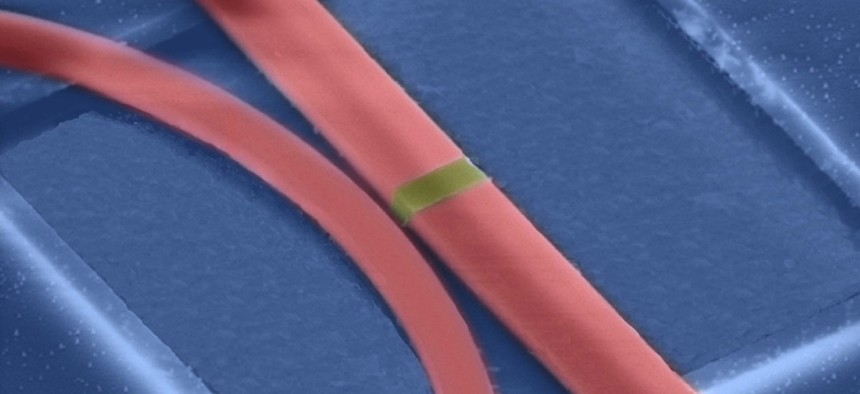Ultra-Fast Memory Chip That Uses Light to Store Information Could be a Game Changer

There it is, at about 1 micrometer across. Nature Photonics/Integrated all-photonic nonvolatile multi-level memory/Rios et al.
This big computing innovation relies on a throwback to the 1990's.
One of today’s biggest computing innovations relies on a throwback to the 1990’s. New research from the University of Oxford shows that scientists have created an ultra-fast memory chip that uses light to store information, as CDs and DVDs do.
The research, conducted by Oxford’s Harish Bhaskaran and Wolfram Pernice of the University of Münster, was published in the scientific journal Nature Photonics on Sept. 21. The researchers developed a new system to store information on a chips made from a material called GST—the same stuff that many rewritable disks are made of—using a combination of high- and low-powered laser pulses. (In most contemporary computer chips, information is transferred through electrical signals instead of lasers, but light travels considerably faster than electricity.)
This isn’t the first time that scientists have built a light-based chip like this—Engadget pointed out that IBM built one in 2012—but this is the first time one has been created that doesn’t need a constant stream of light (or power) to work.

CDs and DVDs have been able to read and write information using light of decades, but the spinning discs can only be written or read at a time. The researchers’ new system allows GST to function in multiple states at the same time. “We could read and write to thousands of bits at once, providing virtually unlimited bandwidth,” Pernice told NDTV.
If scientists are able to develop this chip further—the one they showed off could only store 8 bits of information—and pair it with a processor that also uses light, and connect all the parts together with something like fiber optic cables, the computers of tomorrow could be exponentially faster, storing, writing and computing information close to the speed of light.
Bhaskaran told Oxford that optical chips of this kind could theoretically be a game changer: “These optical bits can be written with frequencies of up to one gigahertz and could provide huge bandwidths,” he said. “This is the kind of ultra-fast data storage that modern computing needs.”
NEXT STORY: EPA Wants to Tap the Crowd for Research Help





